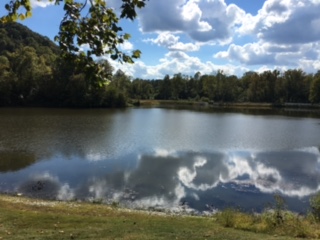I meet a lot of great folks as I talk about Dreamland across America – and hear amazing stories, too.
In Richmond, Virginia recently, where Virginia Commonwealth University had chosen Dreamland as the Common Read for their incoming freshmen, I happened to meet Sheriff Karl Leonard, of nearby Chesterfield County.
We got to talking about a recovery pod – which he calls the Heroin Addiction Recovery Program (HARP) – he instituted in his jail. HARP allows inmates to begin their recovery from addiction, with a nurturing, inmate-led environment. This replaces the stress and tedium of traditionally run jail.
Traditional jail has always been a prod to crime and drug addiction. But sheriffs like Karl Leonard are rethinking how it’s done. I find this transformation of jail, which is growing as a response to our opiate-addiction epidemic, to be one of the most radical and positive ideas happening in America today.
I wrote about another jail, in Kenton County, Kentucky, doing the same thing a while back.
Later, Sheriff Leonard sent me an email with the following story. Please read:
__________
I work very hard with our Heroin Addiction Recovery program (HARP) to educate the public and to break down the stigma that is attached to not only being an addict but a criminal as well. I take recovered addicts from our program out into the community all the time so they can put a face with this disease. And once I do that I have personalized this crisis with them and they can no longer look away. I have these addicts tell their stories which are always compelling and gut wrenching. But just when I think I have heard it all, I get educated myself.
Just a few weeks ago after one such public engagement in the community with two of the HARP members, one male and one female, I decided to take them to lunch at a local Burger King as a reward, which I do often. (They are placed in civilian clothes when we take them out of the jail).
When we pulled into the Burger King parking lot, the male asked me what this was. I was dumfounded by the question and told him it was Burger King. I then asked him if he’d ever been in a Burger King before, thinking he was messing with me. But he said no. I then asked him if he was ever in a McDonald’s before; he again said no.
I shrugged it off and took him inside. He spent several minutes looking at the menu above his head like a child on Christmas morning. He turned to me and asked me if he could get whatever he wanted. I said yes. He then asked me if he could get the biggest thing on the menu and I again said yes, knowing that jail food probably didn’t satisfy this 6’4”, strapping 26-year-old. He then ordered the mushroom Swiss triple burger and a large Coke and fries.
I watched him devour his meal. I asked him if he liked it and he replied he did very much, especially the Coke. I asked him if he had Coke before and he told me he had not. This kid who never had a Burger King or McDonald’s hamburger or a Coke is a heroin addict.
He told me he grew up in a very rural county in Virginia and his father was very strict with him about eating junk food, sugars, sodas, etc. His father made sure they only ate good fresh food without sugars. It is also why he led a life that was drug free – not even marijuana.
His father also helped him with his athletic skills, which helped him become a very good football player in high school. So good he was given a scholarship to play football at a prominent four-year university in our state. I was intrigued by how this seemingly innocent guy became a heroin addict.
Then the common thread to almost all of our heroin addicts revealed itself.
While at the university, he said, he was involved in a bad car crash and suffered a broken femur, shoulder, and other bones. Eventually his doctor gave him Oxycontin and Dilantin pills. He was directed to take four Oxycontin pills a day for 30 days in addition to the Dilantin.
Once the prescriptions ran out he said he started to become very sick but he didn’t know why. He spoke to a friend who told him he was in withdrawal from the painkillers, which was causing his sickness. So he went back to his doctor, who refused to prescribe him any more. He was very sick and tried to get pills on the street but they were hard to get and expensive so he turned to heroin. And that was all it took.
He eventually had bad drug screens at school and was kicked out of the university and lost his full scholarship. When his father found out he was using drugs he disowned him. So now, without a dorm room or family to take him in, he turned to criminal activity to sustain his life.
These stories go on and on. They are all heartbreaking but also examples of how these are not bad people trying to be good but sick people trying to get well. And we are making a difference here with our very unconventional approach to recovery.
Thank you for enlightening a Nation with your book!
Karl




